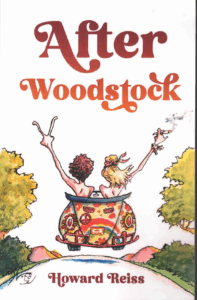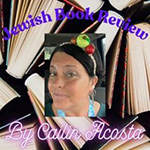 After Woodstock by Howard Reiss; Las Vegas, NV: Krance Publishing; © 2024; ISBN 9798986-428444; 275 pages; Amazon $10.99.
After Woodstock by Howard Reiss; Las Vegas, NV: Krance Publishing; © 2024; ISBN 9798986-428444; 275 pages; Amazon $10.99.
 LA MESA, California – It was the summer of 1969 and best friends Jack and Bryan were graduating high school and going onto college. As they worked together over the summer at the drive-in theatre, they heard of a three-day concert happening in a farm town in Woodstock, New York and got tickets.
LA MESA, California – It was the summer of 1969 and best friends Jack and Bryan were graduating high school and going onto college. As they worked together over the summer at the drive-in theatre, they heard of a three-day concert happening in a farm town in Woodstock, New York and got tickets.
They anticipated this would be a great way to party, listen to great music and just let loose before reporting to freshman orientation the following week. This would also be the “last hurrah” before Bryan and Jack went their separate ways as they had been best friends/brothers since preschool and had done everything together. So, naturally going to Woodstock would be their last experience before getting serious and focusing on college coursework.
Bryan and Jack quit their jobs at the drive-in theatre days before Woodstock and embarked on the 100-mile car ride to the concert venue. As they came to the festival, they were in complete awe of this newfound freedom, no parents to tell them what to do and no rules to follow.
The three-day festival was marked by both losing their virginity, getting and staying stoned the whole time, and grooving to the music which under the influence of marijuana made the experience more enjoyable. Jack and Astra immediately connected at the festival which left Bryan to wander around meeting people who were passing around joints and women offering up “free love.”
The boys made it home and started preparing to go to college. At least, that was what Bryan thought. Jack and Bryan met for pizza before taking off on their college adventures. Jack told Bryan that he and Astra had a cosmic connection and instead of going to college to do what his parents wanted, he would return to Woodstock to be with Astra. He explained they had a connection that no one would understand. Bryan hoped this was just a phase or effects of the marijuana but as orientation came and went and classes started, Jack dropped out before even starting.
For the next 50 years, Bodhi (aka Jack) and Ryan (aka Bryan) wrote letters back and forth to each other sharing their thoughts, life experiences and milestones. Bohdi and Kai (aka Astra) built a life together in Woodstock by living off the grid in a cabin that Bohdi built with no electricity. He worked odd construction jobs and Kai baked and sold clothes she made that the hippies all bought at the Community Center. Bohdi started growing his own marijuana but then got arrested and sent to jail for a few months. Bohdi and Kai had a daughter named Harmony.
The letters between the friends contained little digs at each other’s lifestyles. Bodhi didn’t understand how Ryan could be “working for the man” nor Ryan’s obsession with money and striving to be the top lawyer in New York. Ryan didn’t understand how Woodstock and Kai could have changed Bodhi’s plans to get a doctorate in mathematics and being a part of the computer age.
Ryan continued becoming a lawyer but did not end up falling in love and having a family. Both Kai and Bodhi died from lung cancer due to all the weed they heavily smoked. Harmony and Ryan eventually met, and he sent her money to go to college. He made sure she had what she needed to take care of her family. Before Bohdi died, Ryan was invited to visit him. They were both 80 years old. They were reunited and shared stories of the past before Bohdi took his last breath.
I enjoyed this book since it was a time in history that I was not a part of. I would have loved to have gone to Woodstock if I were 18 and out of high school before going off to college. I would enjoy the music and marijuana; I would not participate in “free love” though.
I imagine I identified with Ryan by following my goals of going to college and getting my master’s. I don’t think a three-day festival would have changed my outlook on life, but this was a different time in history when the Vietnam War was going on. People wanting to live off the land and live a simple life.
Author Howard Reiss states that this book was written as fiction, yet it reads like a true story with the banter between these two best friends and the references to events that happened during this time. The novel kept me intrigued about what was going to happen next.
*
Cailin Acosta is the assistant editor of San Diego Jewish World.